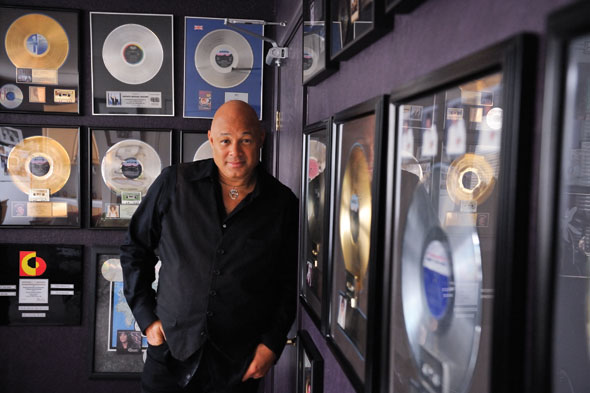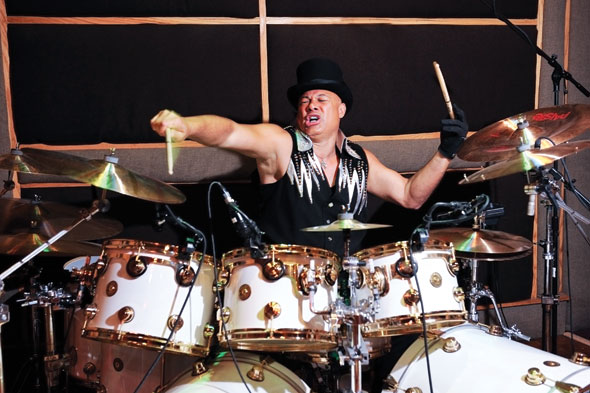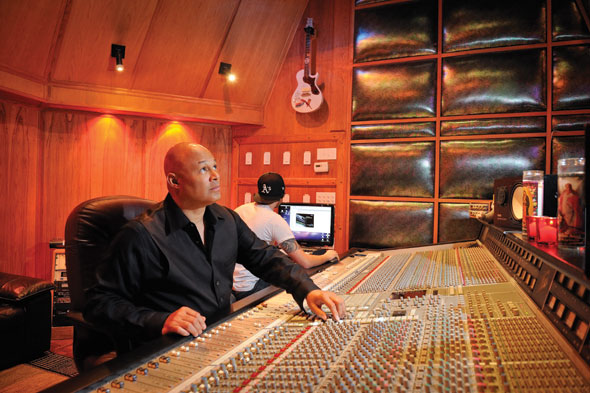
Narada Michael Walden landed in the Bay Area in 1978 and a few years later, put together Tarpan, his world famous recording studio in San Rafael. The Grammy-winning drummer, songwriter, singer and producer was playing drums before he could walk and has collaborated with some of the biggest names in music, including Mariah Carey, Diana Ross, and Al Green. He spoke to SOMA about his career while packing for a trip to Kiev, Ukraine, where he’s putting on a presentation for Fashion Rocks, a two-day fashion show/concert event.
“I’ve been drawn to music since I was born. My father got me a toy drum kit with paper heads when I was young. I destroyed it in one afternoon. I loved records. I’d stand there and watch them spin on the turntable. If there was a beautiful girl on the album cover, I’d stare at her face and try to imagine what she was feeling and what relationship it had to the music on the record.
“I grew up in Plainwell, Michigan, halfway between Chicago and Detroit. By the time I was 11, I was playing music in the clubs black people went to. My first gig was at the Ambassador Lounge. My friend Joel Brooks played organ. I played drums. Joel’s uncle owned the club, so he’d let us open for the blues and jazz cats that came through town. Since we were a duo, we worked hard at getting a full sound out of drums and organ.
Narada enrolled at Western Michigan University in Kalamazoo, but then Deacon Williams and the Soul Revival came through town. “They needed a drummer, so I jumped on the bus and took off. We played the chitlin’ circuit, then on out to California, where we broke up. I tried to make it in Hollywood, then moved to Miami to join the New McGuire Sisters, a jazz/rock band inspired by John McLaughlin’s Mahavishnu Orchestra.”

He adds, “When I finally met McLaughlin, I asked him what inspired him to play the way he did. He told me I should meet his guru, so I went to see Sri Chinmoy and became his disciple. I started praying and meditating; by the time I was 21, I was playing in Mahavishnu.”
After Mahavishnu, successful gigs with Jeff Beck and Tommy Bolan led to a contract with Atlantic Records. As a solo artist, Narada went back to the soul and R&B sounds of his youth. “In Mahavishnu, I was playing in 7/19 and 13/11. You really have to work to play freely in complex tempos, so it was natural to go back to the music I was raised on.” Narada’s albums spawned half a dozen R&B and dance hits including the song “I Don’t Want Nobody Else (To Dance With You).”
“I started producing albums for other people in 1977. My first was Don Cherry’s Hear & Now, one of the first albums to combine jazz and world music. In 1978, I moved to the Bay Area and worked out of the Automatt recording studio. I did a hit album with Stacy Lattislaw – Let Me Be Your Angel – and everybody started calling me.” Narada produced Aretha’s “Freeway of Love” and won a Grammy for Best R&B Song. He later won for Album of the Year with Whitney Houston’s The Bodyguard: The Original Soundtrack Album, and Producer of the Year in 1987 for his work with Franklin, George Michael and Jefferson Starship for the 1988 Olympic Games theme song.

“The challenge is to stay inspired and stay open to the music and the people you meet. To choose love over fear, to stay in the game, to never say no and remember that everybody God brings to you is a blessing. When I was first contacted about working with Whitney Houston, I almost said no, but I decided to make the time and I’m glad I did. We had a great working relationship and she brought the sweat every time she was in the studio. We did “How Will I Know” on her debut album and it went to #1. She was so badass in the studio; she’d nail it on the first take. I produced most of her second album and gave her three more #1s including “I Wanna Dance With Somebody (Who Loves Me).” We had more consecutive #1 songs than the Beatles. We had a wonderful run.”
Narada believes in giving back to the community and created the Narada Michael Walden Foundation to help fund music education programs for children. “When I was growing up, I had people who encouraged me. My grandfather got me my first real drum set when I was 10 years old. Some kids need to develop confidence in order to help them find their direction, and something’s lost if all a kid is doing is playing video games on computers. Playing music teaches them how to interact with other people and lets them know that they don’t have to be afraid of making mistakes. Music isn’t a priority in schools anymore, so someone has to step in and help.”
When he gets back from the Ukraine, Narada’s immediate plan is to start rehearsing with a new band that includes Jeff Beck on guitar. They’ll be touring next year, playing music from Narada’s two new albums, the R&B flavored Thunder and Rising Sun, a collection of instrumentals. The striking cover art for Rising Sun features Narada in a Native American eagle feather headdress. “This is music that takes me back to my roots,” Narada concludes. “I’m Cherokee and Pottawatomie. The midwest is really America’s melting pot. Welsh, African Americans, Irish and Indians all got mixed up. That’s where I got my high cheekbones and peace pipe. If you’re playing music, you got to have a peace pipe.”
nmwproductions.com
Text by J. Poet
Photography by Liz Caruana

